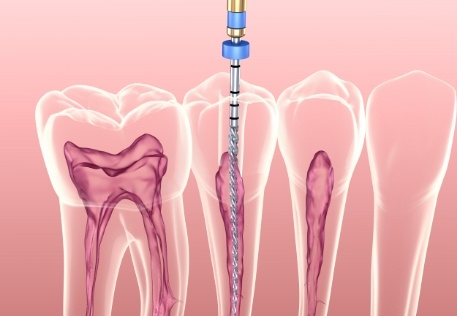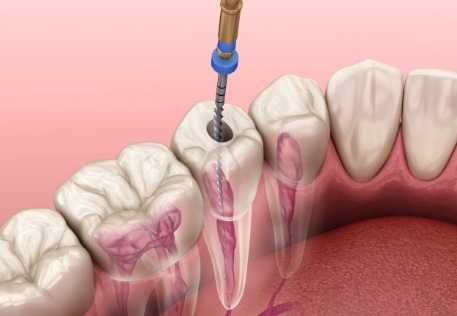Root Canal Therapy – Dallas, TX
Let Us Relieve Your Pain
When you hear the phrase, “root canal,” do you cringe? If you said yes, you’re in good company. Most people consider root canals one of the scariest sounding dental procedures available. The team at Mariya Barnett, DDS Family & Cosmetic Dentistry has good news for you. Root canal therapy in our Dallas, TX dental office actually safely relieves pain and allows patients to avoid unnecessary tooth loss. We know root canal therapy is probably still an intimidating concept, so we invite you to read more on this page or contact our Dallas dental team to find out more today.
Why Choose Mariya Barnett, DDS Family & Cosmetic Dentistry for Root Canal Therapy?
- Natural-Looking Restorations Crafted Following Treatment
- Dedicated to Your Comfort Every Step of the Way
- Varying Degrees of Sedation Dentistry Available
What is a Root Canal?

A root canal is a restorative procedure that is necessary when tooth decay or damage reaches the inner layer of the tooth called the pulp. The nerve system of the tooth is housed within the dental pulp, so when decay and damage reaches this layer of the tooth, the result can be a severe toothache or dental sensitivity. Root canal therapy allows us to relieve this pain, restore the full form and function of the tooth, and prevent unnecessary tooth loss.
How do I know if I Need a Root Canal?

The only way to be certain you’re in need of a root canal is to visit your dentist. However, by knowing the warning signs of root canal infection, you may be able to receive treatment more quickly. The following are the most frequently experienced early warning signs associated with root canals:
- Severe toothache - can be a constant dull throb or sharp pain when biting down
- Dental sensitivity – when the tooth is exposed to heat or cold, lingering tooth pain will occur
- Tooth discoloration - typically, the tooth will darken in spots near the gum line
- Gum infection or inflammation - will be centered around one tooth and may appear as swelling, darkening color, or small, pimple-like sores on gum tissue
What Should I Expect During Root Canal Therapy?

Root canals are often treated as dental emergencies. Without regular preventive maintenance, a small cavity or minor chip may develop into a serious root canal infection. When this happens, Dr. Barnett encourages patients to give her a call right away no matter the time or day of the week so that she can get you in touch with a trusted specialist. Once we’ve determined you need a root canal, the procedure itself is relatively straightforward. They will begin by numbing the area and drilling a small access hole from the top of the tooth into the innermost pulp layer. Then, they extract the damaged pulp and nerve tissue. The tooth is refilled with a substance called gutta percha that functions similarly to the extracted pulp tissue. Next, the access hole is resealed. In most cases, they will also recommend a dental crown be placed to protect and strengthen the root canal treated tooth. In rare cases, we may need to schedule additional visits to treat infection in the gums surrounding the tooth or inside the tooth itself.
Understanding the Cost of Root Canal Treatment

The cost of root canals in Dallas can vary based on a number of factors, but it’s best not to put the procedure off if you learn that you need it. Ultimately, that could result in the need for more costly interventions down the road. Our team at Mariya Barnett, DDS will help you navigate your insurance benefits, any financing options that you may be interested in, and do our best to ensure you receive timely care that fits your budget.
Factors That Can Impact the Cost of Root Canals
There are a few different factors that can impact the cost of root canals, including:
- Where the affected tooth is located, like whether it’s a back molar. This can make the procedure more complex, which could incur a higher cost.
- While most root canals are performed in-office, there are certain cases in which visiting a specialist (endodontist) may be necessary. This can lead to a higher cost.
- Additional services, like dental sedation, will incur separate fees.
Is It Cheaper to Pull My Tooth?
While the cost of a tooth extraction may be less than root canal treatment, the long-term expenses associated with tooth loss are much higher. Once a tooth is extracted, in order to maintain good dental health and alignment, you’ll need to pay to replace the missing tooth. This cost alone could be much higher than root canal therapy.
On the other hand, you could opt to save your tooth with root canal treatment, requiring an up-front investment. However, with good at-home and professional preventive care and maintenance, many of our patients are able to continue enjoying their natural tooth for the rest of their lives.
Does Dental Insurance Cover Root Canal Treatment?
Dental insurance typically covers a portion of the cost of root canal treatment. Our practice accepts most PPO dental insurance plans, including Aetna, BlueCross BlueShield, Cigna, Humana, MetLife, and more. We will file your insurance claim on your behalf to help maximize your benefits to the best of our abilities! We’ll also provide you with a cost estimate before you commit to treatment so you know how much you’ll be expected to pay out-of-pocket.
Other Options for Making Root Canals More Affordable
If you’re uninsured or your insurance leaves you with a high out-of-pocket expense, we also partner with CareCredit and Lending Club to offer additional financing. Our team can help you apply. Once approved, you’ll be able to choose either a 12-month or 24-month low interest plan that will help separate your cost into easy to manage monthly payments.
If you’re uninsured, our In-Office Membership Plan may also be a great option for you! Just pay a flat annual fee of $395 and receive all of your basic preventive care for the year as well as discounts on all other treatments. To learn more or sign up, don’t hesitate to call us!
Root Canal FAQs
Do I Still Need a Root Canal if My Toothache Went Away?
Remember, dental damage – from small cracks to extensive decay – will not go away without the necessary restorative care. So, if your once painful toothache has gone radio silent, that doesn’t mean you’re in the clear. In fact, it’s a sign that the infection has “killed” the nerve. So, don’t wait any longer – reach out to us to schedule your root canal. That way, we can stop the infection in its tracks, restore the health and function of your tooth, and prevent your surrounding teeth and gums from harm.
How Long Does it Take to Recover from a Root Canal?
The recovery time varies depending on a few factors, including how many teeth were treated. That said, most patients are able to resume their usual routine the following day. In some cases, like if your job is physically demanding, we recommend taking a day or two off of work to dedicate to healing.
Note: If you don’t have any PTO left, consider scheduling your appointment on a Friday afternoon so you have the weekend to recover.
What Should I Do Before a Root Canal?
Prior to your procedure, it’s a good idea to do what you can to set yourself up for success afterward. That includes arranging for a trusted adult to drive you home from your appointment (if sedation dentistry is a part of your treatment plan), stocking up on soft foods, and making sure you have OTC pain medication to ease any discomfort following your appointment. It’s also a good idea to keep our contact information on hand so you can easily reach out to us with any questions you have or if any abnormal dental symptoms arise.
What Happens if You Wait Too Long for a Root Canal?
The longer you wait, the higher the chances are of us not being able to save your tooth. It’s also very likely that the infection will spread, potentially affecting your oral and overall health in the process. Simply put, postponing your appointment will only lead to more problems, which is why we strongly recommend not taking this approach. Instead, bring any reservations you have to our team so we can talk through them together before intervening with the necessary restorative care.
Can I Eat Before a Root Canal?
That largely depends on if you’re being sedated. If you are, then eating something prior to arriving at our office may make you nauseous, which is why we recommend fasting. If that’s not the case for you, then we recommend eating a well-balanced and nutrient-dense meal beforehand.
Can Root Canals Be Prevented?
Root canals can oftentimes be prevented. To prevent your teeth from decay, cracks, and other forms of dental damage, we recommend implementing a solid oral hygiene regimen at home, maintaining a well-balanced diet that’s low in added sugar, wearing a mouthguard during sports, and coming in for a dental checkup and teeth cleaning twice a year (or sooner if you start to notice abnormal dental symptoms before then).
I Need a Checkup & Cleaning I Need a Dentist for My Child I am Concerned About Bleeding Gums I Have a Cavity or Broken Tooth I am Missing One or More Teeth I Want to Enhance My Smile I Want a Straighter Smile I am Scared of the Dentist I am in Pain & Need Help I Have Pain in My Jaw I am Concerned About Sleep Apnea Therapy View Our Services






